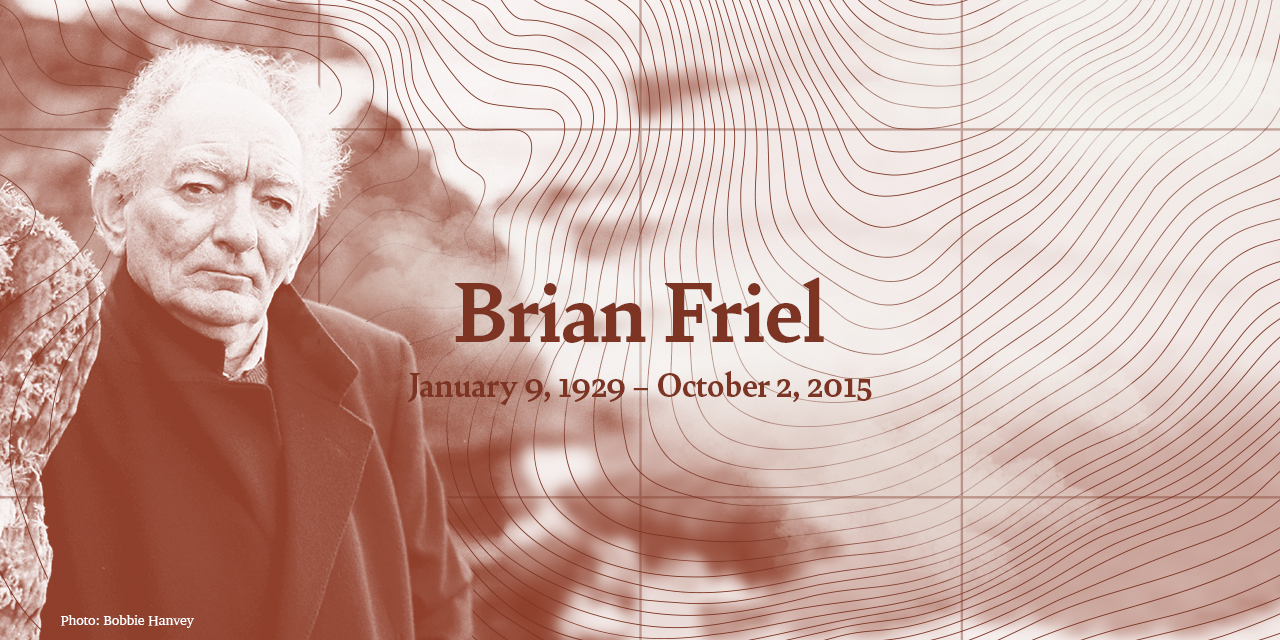Brian Friel was a dramatist and writer often referred to as the ‘Irish Chekhov’ for his plays exploring social and political life in both the Republic of Ireland and Northern Ireland. Over the course of a career spanning more than sixty years, Friel examined the tangled relationships between nationality, history, and narrative, with large, intergenerational casts of characters. His work was influenced by his upbringing in the rural north of Ireland, with more than a dozen of Friel’s works set in the fictional Donegal town of Ballybeg (translating to “small town”).
Friel was born in Killyclogher near Omagh, County Tyrone, to Sean Friel, a primary-school principal, and Mary McLoone, a postmistress. Friel spent half of his childhood in his father’s home city of Derry before attending St. Patrick’s College in Maynooth as a seminarian — he was never ordained, but graduated with a BA in 1948. In 1954, Friel married Anne Morrison, with whom he raised four daughters and a son. Alongside his work as a teacher, Friel began his career as a writer of short fiction, publishing his first short story in an Irish literary magazine before having work published in The New Yorker. By 1960, he was able to leave his teaching post to work full time as a writer.
Friel was given the opportunity to hone his skills as a dramatist when, in 1963, Tyrone Guthrie invited him to observe rehearsals in the Guthrie Theater in Minneapolis, an experience which Friel described as “enabling.” Shortly after, Friel wrote his first major success, Philadelphia, Here I Come!, which takes place the evening before a young man emigrates to the United States from Ballybeg. Initially produced at the Gaiety Theatre as part of the Dublin Theatre Festival, the play came to Broadway in 1966, where it received six Tony Award nominations including Best Play and Best Director.
Friel’s momentum as a playwright coincided with The Troubles in Northern Ireland, a period of violent sectarian conflict between nationalists, who wanted Northern Ireland to be part of the Republic of Ireland, and unionists, who wanted Northern Ireland to remain part of the United Kingdom. In 1972, Friel was a member of the crowd present at the Bloody Sunday massacre in Derry as he marched in protest of internment without trial. British soldiers opened fire on protesters, killing at least thirteen civilians and injuring several more. The incident — and its cover-up — inspired Friel’s 1973 play The Freedom of the City, which led Friel to meet actor Stephen Rea.
In 1980, Friel and Rea founded Field Day Theatre Company, and its inaugural production of Friel’s new play Translations was performed in the Guildhall in Derry. Field Day began publishing pamphlets — and, later, anthologies — on a wide variety of historical, cultural, and academic subjects. At this point in his career, Friel began adapting the works of Anton Chekhov — including Three Sisters, Uncle Vanya, and The Bear — a practice he would continue for more than two decades.
Perhaps Friel’s best-known work, Dancing at Lughnasa, premiered at the Abbey Theatre in 1990, and shortly thereafter transferred to the National Theatre in London, winning the Olivier Award for Play of the Year. Dancing at Lughnasa ran for more than a year on Broadway and received three Tony Awards including Best Play. A film version was released in 1998 starring Meryl Streep and directed by Pat O’Connor.
In 2006, Friel was elected to the position of Saoi of the Aosdána, the highest honor bestowed by the Irish association of artists, and in 2009 Queen’s University, Belfast, inaugurated the Brian Friel Theatre and Centre for Theatre Research. Friel died on October 2, 2015.
Plays include Hedda Gabler (after Ibsen), The Home Place, Performances, Three Plays After (Afterplay, The Bear, The Yalta Game), Uncle Vanya (after Chekhov), Give Me Your Answer Do!, Molly Sweeney (Winner of the New York Drama Critics Circle Award for Best Foreign Play), Wonderful Tennessee, A Month in the Country (after Turgenev), The London Vertigo (after Charles Macklin), Dancing at Lughnasa (Winner of 3 Tony Awards including Best Play, New York Drama Critics Circle Award for Best Play, Olivier Award for Best Play), Making History, The Communication Cord, American Welcome, Three Sisters (after Chekhov), Translations, Aristocrats (Winner of the Evening Standard Award for Best Play and New York Drama Critics Circle Award for Best Foreign Play), Faith Healer, Fathers and Sons, Living Quarters, Volunteers, The Freedom of the City, The Gentle Island, The Mundy Scheme, Crystal and Fox, Lovers: Winners and Losers, The Loves of Cass Maguire, Philadelphia, Here I Come!
Historical Content by Sarah Moran
